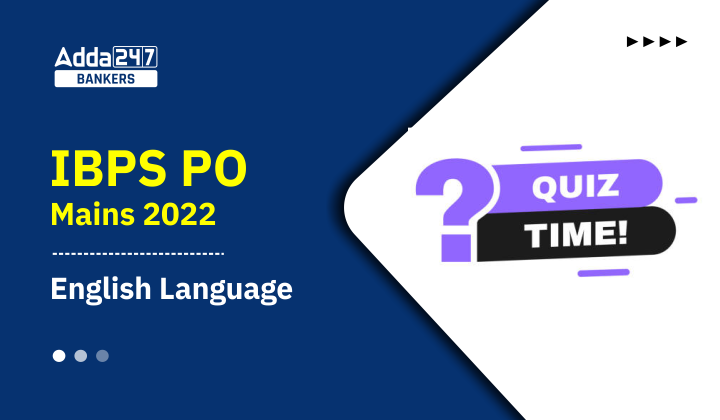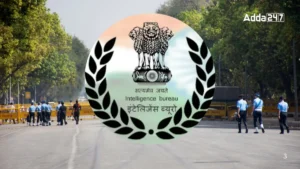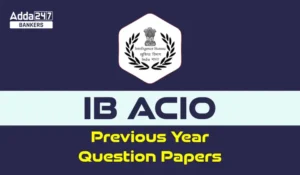Directions (1-5): Which of the phrases a), b), c) and d) given below each statements should be placed in the blank space provided so as to make a meaningful and grammatically correct sentence? If none of the sentences is appropriate mark e), i.e ‘None of these’, as the answer.
Q1. A confluence of adverse domestic and global factors is threatening to push the Indian rupee to historic lows, ________.
(a) encouraging people to invest in share markets.
(b) compelling people to withdraw money from banks and keep them in their own custody.
(c) forcing common men to purchase gold coins from banks.
(d) making the import of crude oil and coal more expensive and aggravating the problems of the economy.
(e) None of these
Q2. “__________ that Mr.Verma was influencing any player of his team to underperform and hence resorting to spot fixing,” police said.
(a) There is ample proof or indication yet
(b) There is no proof or indication yet
(c) Who said
(d) There was no proof and indication yet
(e) None of these
Q3. _________ the offences that Ranbaxy has pleaded guilty to in the US, the penalty it has paid, and the exact nature of infringements cited in the case.
(a) No, we are still ascertaining the fact that
(b) I read the statement, and yes, we need to consider this aspect of
(c) We are also looking into
(d) We would identify international events and take
(e) None of these
Q4. The finance ministry has asked all government bodies to disclose the reasons for rejecting or excluding bidders from contracts awarded by them __________.
(a) in order to bring more transparency and avoid litigations from losing bidders
(b) in order to pay compensation to losing bidders
(c) in order to revalidate the cancelled bids
(d) in order to cancel the licence of agitating bidders
(e) None of these
Q5. The government’s decision to begin the so-called conciliation talks with Vodafone is _______.
(a) just beating about the bush
(b) to woo the foreign investors and bring in a lot of money in India
(c) to drive away the company from India
(d) a sensible effort to bring to an end an episode that has bedeviled India’s investment climate
(e) None of these
Directions (6-10): Each question below has two blanks,each blanks indicating that something has been omitted. Choose the set of words for each blank that best fits the meaning of the sentence as a whole.
Q6. The organization _______to popularize Indian classical music among the youth which has last _______with its cultural roots.
(a) endeavors, touch
(b) wishes, interest
(c) efforts, experience
(d) exerts, intrigue
(e) need, relation
Q7. One of the major critiques of the examination system is that it _______to a spirit of__________ competition among the students.
(a) results, defective
(b) accompanies, adequate
(c) develops, intense
(d) takes, severe
(e) leads, unhealthy
Q8. Auroras are natural light displays in the sky, usually ________at night, ________in the polar regions.
(a) watch, upward
(b) noticed, peculiar
(c) observed, only
(d) found, most
(e) follows, mainly
Q9. After the board examinations, students are______ up for the various entrance examinations_______ for next month.
(a) ready, mainly
(b) gearing, scheduled
(c) prepared, programmed
(d) set, duration
(e) geared, kept
Q10. The governmental _____spurred dramatic improvements in the way waste management is ______out in many hospitals.
(a) rule, thrown
(b) plans, conduct
(c) crusade, one
(d) efforts, carried
(e) venture, disposed
Directions (11-15): Read the following passage and answer the following questions based on the given passage.
The Centre has announced the constitution of a committee to revisit several provisions of the Companies Act, 2013 that impose stiff penalties and, in some cases, prison terms as well, for directors and key management personnel. The 2013 law entailed the first massive overhaul of India’s legal regime to govern businesses that had been in place since 1956 and was borne of a long-drawn consultative process. Now, this 10-member committee appointed by the Corporate Affairs Ministry has been tasked with checking if certain offences can be ‘de-criminalised’. The panel, which includes top banker Uday Kotak, has been given 30 days to work out whether some of the violations that can attract imprisonment (such as a clerical failure by directors to make adequate disclosures about their interests) may instead be punished with monetary fines. It will also examine if offences punishable with a fine or imprisonment may be re-categorised as ‘acts’ that attract civil liabilities. Importantly, the committee has also been asked to suggest the broad contours for an adjudicatory mechanism that allows penalties to be levied for minor violations, perhaps in an automated manner, with minimal discretion available to officials. In fact, some of the provisions in the law are so tough that even a spelling mistake or typographical error could be construed as a fraud and lead to harsh strictures.
The government hopes such changes in the regulatory regime would allow trial courts to devote greater attention to serious offences rather than ______(A)_______. The decision to build in harsh penalties and prison terms for corporate misdemeanours in the 2013 law was, no doubt, influenced by the high-pitched anti-corruption discourse that prevailed in the country at that moment in time. Apart from several cases of crony capitalism that had come to light during the second UPA government, massive corporate frauds reported at once-revered firms such as the erstwhile Satyam Computer Services had spooked investors and other stakeholders about the credibility of corporate India’s books and governance standards. When the NDA came to power in May 2014, a comprehensive review of the Companies Act was at the top of industry’s wish list as a means to revive the economy. Industry captains had red-flagged the impact of such provisions on the ease of doing business, and investor sentiment in general. Owing to the incidents corporate wrong doings, there has been a lack of trust that has developed between the industry and government but this should not hamper the normal business operations, they had argued. Four years down the line, the government is finally moving purposefully on this, a rethink perhaps triggered by the fact that private sector investment is yet to pick up steam and capital still seeks foreign shores to avoid regulatory risks. One hopes this is followed up on swiftly, before the ruling party slips into election mode.
Q11. What can be the possible inference drawn from the passage given above?
(a) In India, company legislation has until recently been the main instrument for improving corporate governance.
(b) Over the last few years, regulatory bodies have taken numerous steps towards inculcating good corporate governance practices among Indian companies.
(c) Corporate governance has become a subject of immense importance in recent years for the state governments.
(d) A relook at the overly harsh provisions of the Companies Act must yield action.
(e) Corporate governance is a dynamic field of study and practice.
Q12. Which of the following phrases can appropriately fill in the blank (A) to make it contextually and grammatically correct?
(a) consider management as completely obsolete and discard it to give way to what is called governance
(b) taking into consideration all the factors it was necessary to ascertain the awareness of general public
(c) get overloaded with cases as zealous officials blindly pursue prosecutions for even minor violations
(d) a, b and c
(e) governance has no justification to override management because management is not worth its name
Q13. What was the topmost expectation of the corporate sector when the UPA government lost the power in Centre?
(a) New standards for corporate governance
(b) Companies Act, 2013, which is a milestone on corporate governance, should not be altered.
(c) Review of Companies Act for reviving the Indian economy
(d) Reduce the administrative and regulatory burdens introduced by UPA government for corporate governance.
(e) None of these
Q14. What were the basic reasons for creation of the ten members committee for revisiting the provisions of Companies Act, 2013?
(i) To check whether any offence which is punishable through imprisonment can instead be punished on the basis of monetary fines.
(ii) To evaluate whether offences can be recategorised as acts which attract civil liabilities.
(iii) To suggest a mechanism where penalties for minor violations can be automated with minimum involvement by the officials.
(a) Only (i)
(b) Only (ii)
(c) Both (i) & (ii)
(d) Both (i) & (iii)
(e) All (i), (ii), (iii)
Q15. What have been the point of view put up by industry leaders against the consequences of several corporate frauds?
(a) The positive effect of corporate governance on different stakeholders ultimately is a strengthened economy, and hence good corporate governance is a tool for socio-economic development.
(b) Strong governance standards focusing on fairness, transparency, accountability & responsibility are vital not only for the healthy & vibrant corporate sector growth, as well as inclusive growth of the economy.
(c) Good corporate governance is essential for the integrity of Corporations, Financial Institutions & Markets. It ensures the health of our economies & their stability.
(d) A trust deficit between industry and government owing to stray incidents of corporate malfeasance should not inhibit normal business operations.
(e) None of these
Solutions
S1.Ans.(d)
Sol. Notice that since the value of Indian rupee is in danger of decreasing sit will have a direct impact on a country’s economy and hence cost of importing will be increased. None of the other options are making any sense and if are added doesn’t complete it properly hence option (d) is the correct choice.
S2.Ans.(b)
Sol. Only option (b) is correct
S3.Ans.(c)
S4.Ans.(a)
S5.Ans.(d)
S6. Ans.(a)
S7. Ans.(e)
S8. Ans.(c)
S9. Ans.(b)
S10. Ans.(d)
S11. Ans. (d)
Sol. Here, the paragraph discussed the Company Act and shortcomings of some of its provisions. It also states the formation of the ten member committee to look into the provisions of the act and the need to address those shortcomings. Hence, option (d) is the most suitable answer choice.
S12. Ans. (c)
Sol. Here, only the phrase given in option (c) fits in perfectly in the given blank with which we can clearly infer that the statement mentions that it has been done with the objective to allow the authorities to devote attention towards serious offences rather than focusing minor violations. Hence, option (c) is the most suitable answer choice.
S13. Ans. (c)
Sol. To validate the answer, refer to the second paragraph, which mentions, “When the NDA came to power in May 2014, a comprehensive review of the Companies Act was at the top of industry’s wish list as a means to revive the economy.” Here, the answer has been clearly stated in the statement given in option (c). Hence, option (c) is the most suitable answer choice.
S14. Ans. (e)
Sol. To validate the answer, refer to the first paragraph of the passage given above, “The panel, which includes top banker Uday Kotak, has been given 30 days to work out whether some of the violations that can attract imprisonment (such as a clerical failure by directors to make adequate disclosures about their interests) may instead be punished with monetary fines. It will also examine if offences punishable with a fine or imprisonment may be re-categorised as ‘acts’ that attract civil liabilities. Importantly, the committee has also been asked to suggest the broad contours for an adjudicatory mechanism that allows penalties to be levied for minor violations, perhaps in an automated manner, with minimal discretion available to officials.” Here, we can infer the quoted text from all the three statements (i), (ii), (iii). Hence, option (e) is the most suitable answer choice.
S15. Ans. (d)
Sol. To validate the answer, refer to the second paragraph of the passage given above, which mentions, “Owing to the incidents corporate wrong doings, there has been a lack of trust that has developed between the industry and government but this should not hamper the normal business operations, they had argued.” Here, the quoted text has been clearly justified in the statement given in option (d). Hence, option (d) is the most suitable answer choice.





 IB ACIO Vacancy 2025 Notification Out, ग...
IB ACIO Vacancy 2025 Notification Out, ग...
 IB ACIO Previous Year Papers in Hindi: I...
IB ACIO Previous Year Papers in Hindi: I...
 18th July Daily Current Affairs 2025: सभ...
18th July Daily Current Affairs 2025: सभ...

